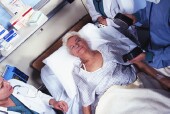

Seniors are much more likely than younger people to find themselves in the hospital after outpatient surgery, a new study finds.
“These seniors were supposed to stay out of the hospital since the procedures were performed in the ambulatory setting, but they were admitted to the hospital within 30 days,” corresponding study author Dr. Gildasio De Oliveira Jr., an assistant professor in the Center for Healthcare Studies at Northwestern University’s Feinberg School of Medicine in Chicago, said in a university news release.
“Age was the biggest factor associated with readmission and complications. It’s not because they are sicker, it’s because they are older and have trouble understanding their discharge instructions and medication dosing, which often are not clearly explained,” he said.
Researchers analyzed data from more than 53,000 Americans who underwent outpatient surgery in 2012, and found that those aged 65 and older were 54 percent more likely to be readmitted to the hospital within 30 days than those younger than 65.
Patients’ health before outpatient surgery was not a factor in the higher readmission rate for older patients, according to the researchers.
The study was published in the August issue of the Journal of the American Geriatrics Society.
To prevent hospital readmissions after outpatient surgery, seniors need to be given more understandable discharge instructions and they need to be evaluated for their ability to care for themselves after the procedure, De Oliveira said.
Over the past decade, outpatient procedures in the United States have increased 300 percent. About 9 million outpatient surgeries a year are performed on patients aged 65 and older, the study authors said.
“When patients are sent home on the same day, a lot is required of them to take care of themselves, and it’s beyond the capability of a lot of older individuals. They have to administer opioids [narcotic painkillers] and monitor themselves for emergency problems such as bleeding or infection,” De Oliveira said.
“Before allowing patients to get ambulatory [outpatient] surgery, surgeons also should verify if patients are able to take care of themselves at home, and if they have support. If not, patients should be admitted to the hospital after surgery or have some type of formal support by a nurse to help them at home,” he concluded.
More information
The American Society of Anesthesiologists has more about outpatient surgery.
Source: HealthDay
Copyright © 2024 HealthDay. All rights reserved.

Leave a Reply